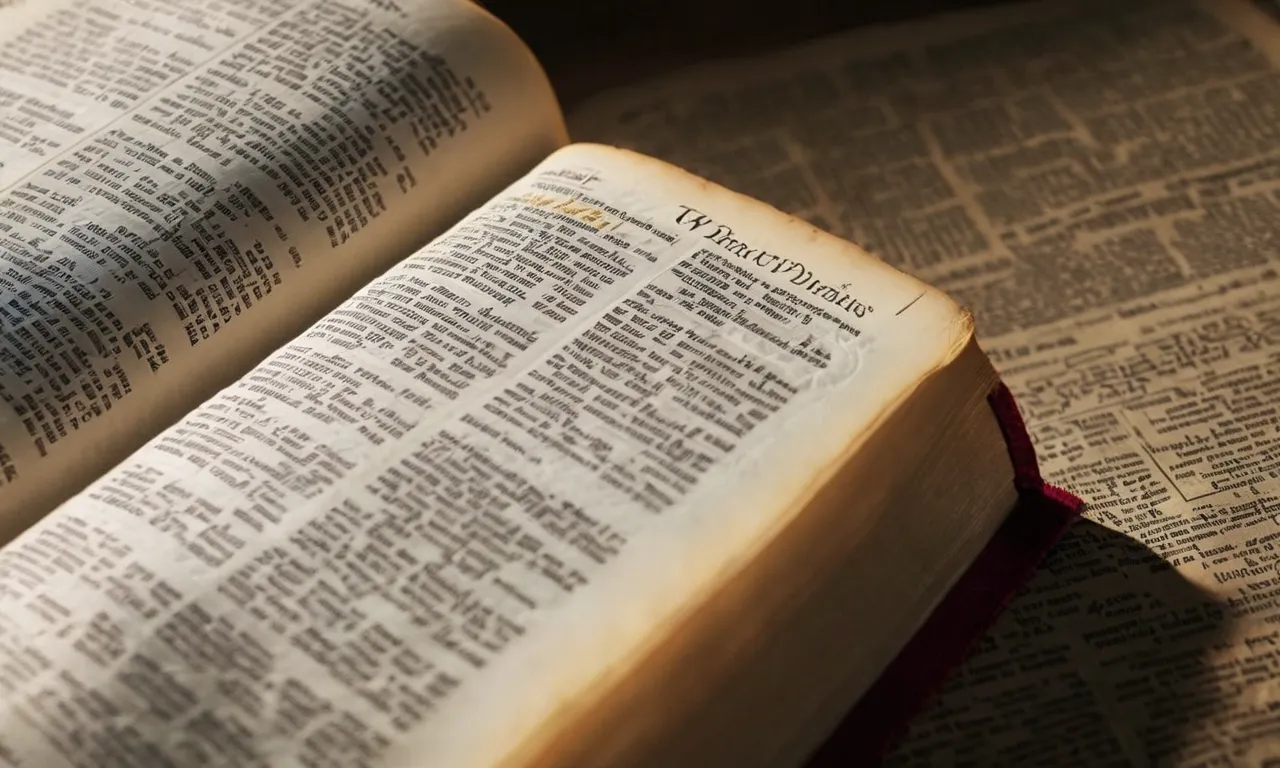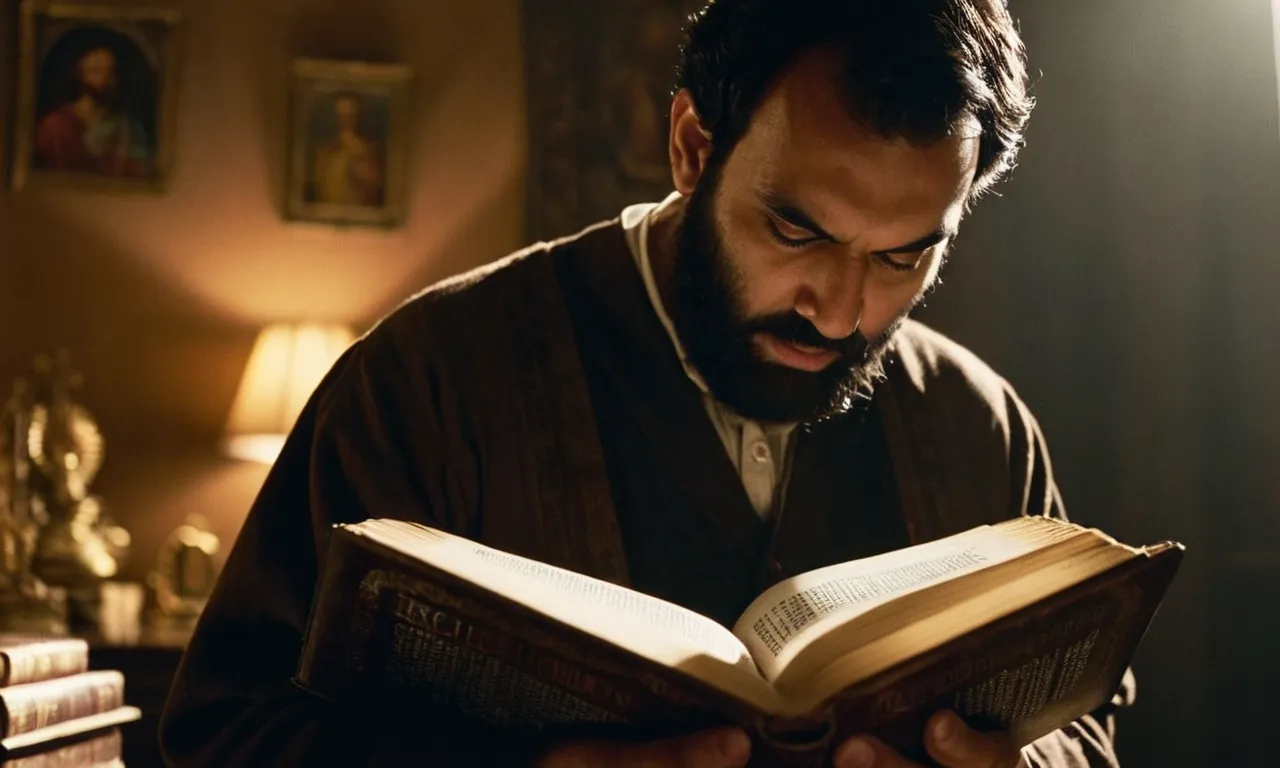Bible Characters Who Were Afraid And How They Overcame Fear
Fear is a very common and natural human emotion that even characters in the Bible experience. In times of danger, crisis, or uncertainty, many prominent biblical figures dealt with paralyzing fear.
If you’re short on time, here’s a quick answer to your question: Many major bible characters like Moses, David, Elijah, Jeremiah, and Jesus’ disciples experienced fear at some point, but they turned to God in faith and were able to overcome their fear.
Moses Was Afraid to Speak for God
Moses Felt Fear and Inadequacy When God Called Him
When God first called Moses from the burning bush to lead the Israelites out of Egypt, Moses felt overwhelmed with fear and inadequacy.
He said to God, “Who am I that I should go to Pharaoh and bring the Israelites out of Egypt?” (Exodus 3:11).
Moses focused on his own weaknesses – his faltering speech and lack of leadership abilities. He felt completely unqualified for the huge task God asked him to do. Many biblical heroes struggled with fear when called to daunting tasks for God.
Like Moses, they focused more on their own limitations rather than God’s power and promises.
God Reassured Moses with Aaron’s Help and Supernatural Signs
God did not let Moses’ fears stop His plan. He reassured Moses by allowing Aaron, his brother, to speak for him (Exodus 4:14-16).
God also equipped Moses with miraculous signs to show before Pharaoh – the staff that turned into a snake, his hand that became leprous, and the Nile River turning to blood (Exodus 4:1-9).
Armed with Aaron’s help and displays of God’s power, Moses found the courage to confront Pharaoh and lead the Israelites to freedom.
Like Moses, we can overcome our fears by relying on God’s support system of people and by focusing on His proven power more than our supposed limitations.
David Feared Saul and Death
David Feared for His Life When Saul Tried to Kill Him
David was on the run for several years as King Saul tried multiple times to kill him. Saul was jealous and insecure about David’s rising popularity and disobeyed God’s command to stop pursuing him.
David had to flee and hide to avoid Saul’s murderous intentions (1 Samuel 18-26).
Though David had opportunities to kill Saul, he refused to harm “the Lord’s anointed.”
David once secretly cut off a corner of Saul’s robe but then felt guilty, saying, “The Lord forbid that I should do this thing to my master, the Lord’s anointed” (1 Samuel 24:6).
David had reverence for God’s sovereign choice of Saul as king.
David must have felt afraid and distressed during this time. He may have wondered if he would ever become king as promised or if Saul would eventually catch and kill him. But David chose to trust in God’s protection despite his fear.
After cutting Saul’s robe, David said, “the Lord delivered you into my hand today, but I would not stretch out my hand against the Lord’s anointed” (1 Samuel 24:10).
David Feared Death But Trusted God for Deliverance
One of David’s psalms records a time when he feared for his life and cried out to God for deliverance. He wrote, “In my distress I called upon the Lord; to my God I cried for help.
From his temple he heard my voice, and my cry came to his ears” (Psalm 18:6).
Though afraid, David affirmed his trust in God saying, “The Lord is my rock and my fortress and my deliverer, my God, my rock, in whom I take refuge, my shield, and the horn of my salvation, my stronghold” (Psalm 18:2).
He praised God for rescuing him from death, for being his strength and refuge.
In another psalm, David described how taking refuge in God can overcome fear. “God is our refuge and strength, a very present help in trouble. Therefore we will not fear” (Psalm 46:1-2a).
By turning to God for deliverance during times of fear and distress, David found the courage to move forward in fulfilling God’s purpose for his life.
Though David faced fearful circumstances, he chose to trust in God’s faithfulness and protection. His example shows how we can bring our fears to God in prayer while believing He is able to deliver us.
As Isaiah 41:10 says, “Fear not, for I am with you; be not dismayed, for I am your God; I will strengthen you, I will help you.”
Elijah Was Afraid of Jezebel’s Threats
Elijah Fled in Fear After His Mount Carmel Victory
Elijah had just experienced a mighty victory over the prophets of Baal at Mount Carmel. After calling down fire from heaven, Elijah ordered the slaughter of 450 prophets of Baal (1 Kings 18:40).
When Queen Jezebel heard about this, she was furious and sent a messenger to Elijah saying, “May the gods deal with me, be it ever so severely, if by this time tomorrow I do not make your life like that of one of them” (1 Kings 19:2).
In other words, Jezebel threatened to kill Elijah.
Despite having witnessed God’s amazing power on Mount Carmel, Elijah was terrified of Jezebel’s threats. The mighty prophet who had fearlessly confronted the prophets of Baal now fled in fear for his life all the way to Beersheba in Judah.
Leaving his servant there, Elijah went another day’s journey into the wilderness and collapsed under a broom tree. In despair, he pleaded with God to take his life (1 Kings 19:3-4).
This dramatic turn of events shows how quickly our emotions can change from courageous faith to fearful despair.
God Comforted and Strengthened Elijah in His Moment of Fear
In Elijah’s moment of deep despair, God compassionately cared for his frightened prophet. An angel provided food and water to strengthen Elijah for a 40 day, 40 night journey to Mount Horeb.
There God spoke to Elijah, not in the powerful wind, earthquake or fire, but through a gentle whisper.
God assured Elijah he was not alone – there were 7,000 in Israel who still followed the Lord (1 Kings 19:11-18).
God patiently listened to Elijah’s fears and complaints, comforted and strengthened him, and gave him clarity on next steps.
Elijah’s experience shows that even the most courageous heroes of faith can become fearful and depressed.
However, our compassionate God does not reject or condemn us in those moments of despair. Like Elijah, we need to pour out our hearts to God who will comfort, strengthen and guide us forward.

Jeremiah Feared Speaking God’s Message
Jeremiah Felt Inadequate and Overwhelmed by His Prophetic Call
Jeremiah was initially terrified when God called him to be a prophet. He felt wholly inadequate for the task, saying “Ah, Lord God! Truly I do not know how to speak, for I am only a youth” (Jeremiah 1:6).
God had called him for an immense responsibility – to speak difficult truths to the people of Judah about their unfaithfulness. Jeremiah understandably felt overwhelmed and wanted to resist God’s call.
However, God reassured Jeremiah by touching his mouth and putting His own words into Jeremiah’s mind (Jeremiah 1:9).
Despite his fears, Jeremiah faithfully spoke God’s message for over 40 years as Judah rejected his warnings and descended into chaos.
He boldly proclaimed God’s word despite intense opposition and persecution. According to church tradition, Jeremiah was eventually stoned to death in Egypt by his own people for speaking difficult truths that no one wanted to accept.
God Reassured Jeremiah With His Divine Presence and Power
As Jeremiah struggled with feelings of inadequacy, God delivered an encouraging message saying “Do not be afraid of them, for I am with you to deliver you” (Jeremiah 1:8).
God promised to strengthen Jeremiah with divine power to overcome any opposition: “See, I have made you this day a fortified city and an iron pillar and bronze walls against the whole land” (Jeremiah 1:18).
This reassurance enabled Jeremiah to boldly obey God’s call despite intense persecution for over 40 years. Other prophets like Isaiah received similar reassurance of God’s presence during their frightening calls (Isaiah 41:10).
Ultimately, facing fear requires trusting that God is with us even in difficult times. As it says in Isaiah 41:13: “For I, the LORD your God, hold your right hand; it is I who say to you, ‘Fear not, I am the one who helps you’. “
Jesus’ Disciples Feared the Storm and Death
The Disciples Feared Drowning in a Raging Storm
One day Jesus and his disciples got into a boat to sail across the Sea of Galilee. While they were out on the water, a terrible storm arose.
The wind whipped up massive waves that crashed over the sides of the boat, quickly filling it with water (Mark 4:37).
The disciples, being experienced fishermen, knew they were in grave danger of sinking and drowning. Gripped with fear, they cried out to Jesus for help (Matthew 8:25).
This life-threatening storm revealed the disciples’ lack of faith in Jesus’ power and protection. Though they had seen Him perform miracles like healing the sick and casting out demons, they did not yet fully trust that He could save them from drowning.
Their terror in the face of the storm exposed their doubt.
Jesus Calmed the Storm and Told the Disciples Not to Fear
In the midst of the disciples’ panic, Jesus was sleeping soundly in the stern of the boat. Awakened by their frightened cries, He calmly stood up and rebuked the wind and waves saying, “Peace, be still!” (Mark 4:39).
Instantly, the storm ceased, and the sea became perfectly calm. Then Jesus asked His disciples why they were afraid and had such little faith in Him (Mark 4:40).
This awe-inspiring miracle demonstrated Jesus’ divine power over the forces of nature. The wind and sea obeyed His authoritative voice.
Through this experience, Jesus wanted to increase His disciples’ faith in Him. He showed them they could trust Him fully, even in life-threatening danger.
He had the power to protect them, so they did not need to fear.
Jesus tells us, his modern-day disciples, the same thing. We do not need to be afraid because He has overcome the world and will give us His perfect peace (John 16:33, John 14:27).
When storms come in our lives, in faith we can call out to Him for help knowing He has the power to calm our storms and fill our hearts with His peace if we let Him.
Conclusion
As we have seen, fear affected the great men and women of the Bible just as it does us today. However, they turned to God in their moments of fear and He gave them courage, strength and peace to overcome.
We too can bring our fears to God in prayer and faith, trusting that He will help us to rise above crippling anxiety. With God’s power and presence, we can boldly move past our fears just as key biblical figures did.








